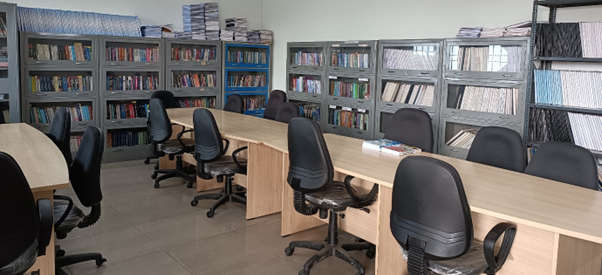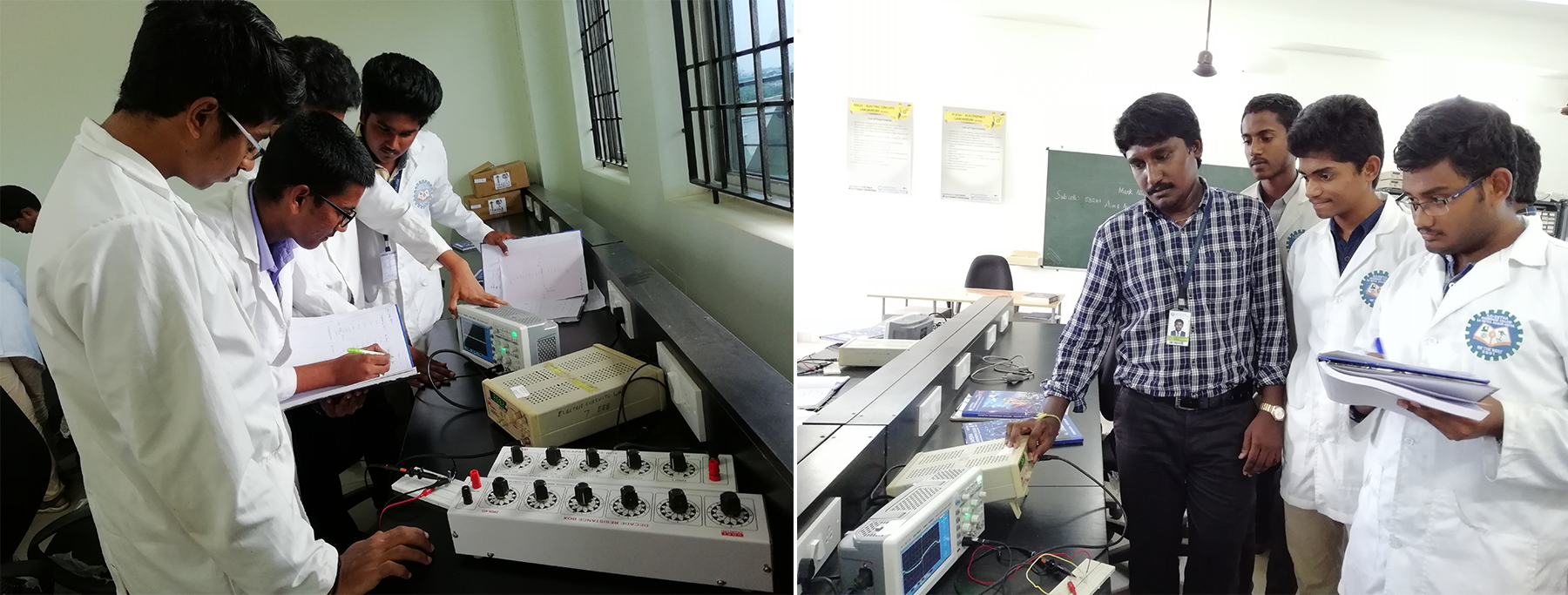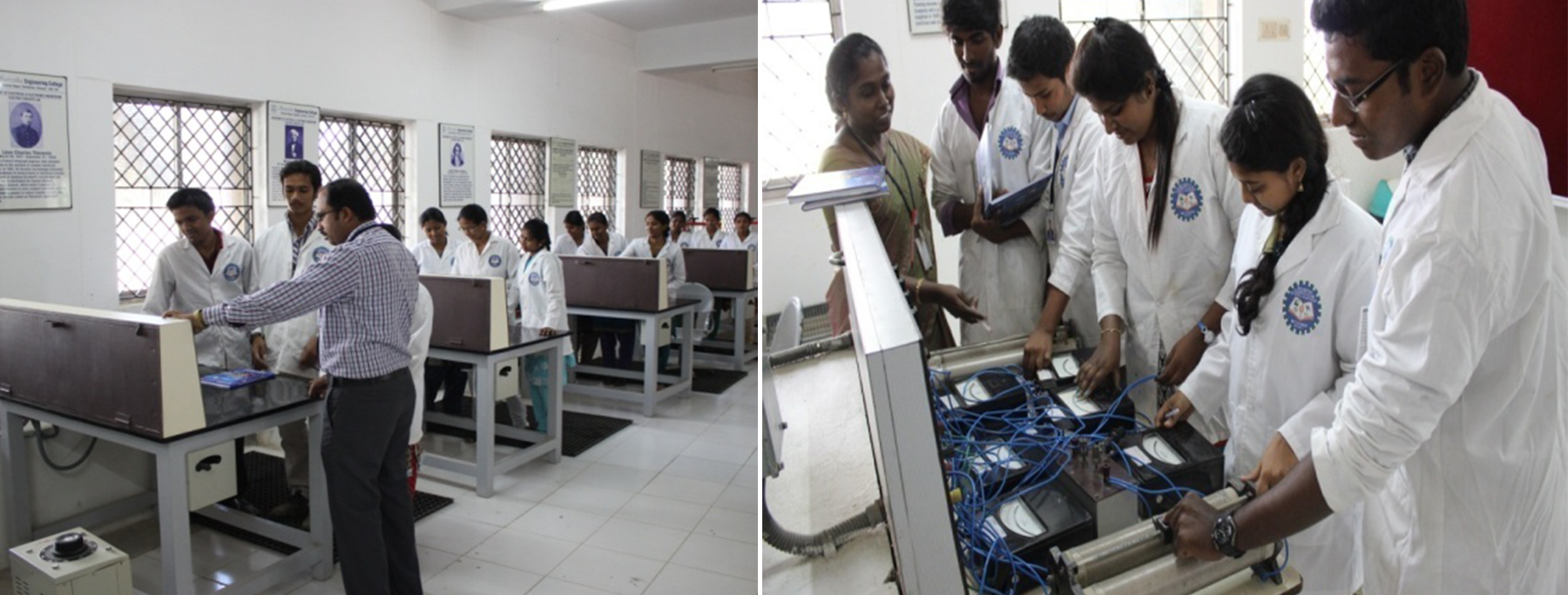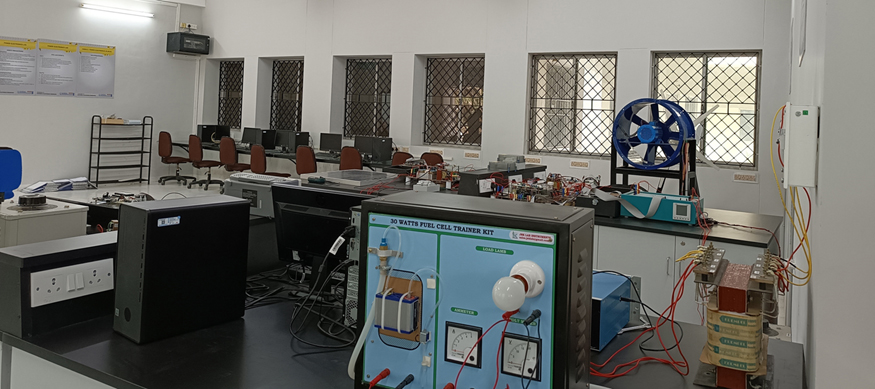LABORATORIES
|
S.No. |
Laboratory |
Location |
Faculty Incharge |
|
1 |
Electric Circuits Laboratory |
EEE, 4F, OW |
Dr.R.Hemalatha |
|
2 |
Electrical Machines Laboratory |
EEE, GF |
Dr. R. Vinifa |
|
3 |
Microprocessor & Microcontroller Laboratory |
EEE, 2F, OW |
Mr. T. D. Suresh |
|
4 |
Embedded Systems Laboratory |
EEE, 2F, OW |
Mr. T. D. Suresh |
|
5 |
Power System Simulation Laboratory |
EEE, 1F, OW |
Dr.S.Rajalingam |
|
6 |
Renewable Energy Systems Laboratory |
EEE, 1F, OW |
Mr.S.Joyal Isac |
|
7 |
Mission 10x Laboratory |
EEE, 3F, OW |
Dr.R.Karpagapriya |
DEPARTMENT LIBRARY

About the Library
The department library is located in round building, EEE block, outer wing, fourth floor. The library holds books from various publishers in different volumes in various specializations of electrical, electronics, measurements, control systems, renewable energy, etc., Students and faculties can make use of the department library. The library occupies the books recommended by the head of the department, faculty members and subject coordinators. We accept and appreciates the faculties on donating books to the department library.
Rules & Regulations
Every semester, the books from the department library can be borrowed both by students and faculties. The department library has rules to follow,
- Students, teaching faculties and non-teaching faculties are the members of the department library.
- Books will be issued to any student or faculties after returning the books issued in the previous semester or clearing the dues if any.
- Loss of books, if any, should be reported to the department librarian in-charge immediately and it should be replaced by a new edition of the book with same title and author.
Incharge:
Mrs. R. Hemalatha, AP(OG) / EEE
Dept., Library In-charge
Dept., of EEE
The objective of this laboratory is to provide practical understanding of renewable energies (Solar, Wind, hybrid, and Fuel Cells). It is imperative for the sustained growth of the economy. This course envisages the new and renewable source of energy, available in nature and to expose the students on sources of energy crisis and the alternates available, also stress up on the application of non-conventional energy technologies.
Features:
- 1Kw, 120v solar panel
- PV emulator 62050H-600S
- MPPT charge controller
- Battery impedance analyser
- Microwind turbine trainer system
- 100W Fuel cell
- PQ analyser
- Fluke 438-II
- Power Quality
- Motor Analyzer
Electric Circuits Lab
The objective of this laboratory is to provide practical understanding of circuit theory concepts. The relation of theoretical circuit elements, circuit components and theoretical laws to understanding of circuit functioning is the main objective of this lab. This lab gives a platform for undergraduate students for practical implementation of Electronics Circuits and Projects.
Features:
- Cathode Ray Oscilloscope
- Digital Storage Oscilloscope
- Function Generator
- Semiconductor devices like Diode, Zener Diode, NPN Transistors, JFET, UJT, Photo diode,Photo Transistor
- Resistors, Capacitors and inductors
- Regulated Power Supply 5, ± 15V
- Single Phase Energy Meter
- AC/DC – Voltmeters, Ammeters, Multimeters.
- Bread boards

Electrical Machines I & II Labs
The aim of this laboratory is to expose the students to the operation of D.C. and A.C. Machines, Transformers, Synchronous Machines and Induction Motors and give them experimental skill. Swinburne’s test, Hopkinson’s test on D.C motor – Generator set, Load test on various electrical motors and transformers exposes the students to determine the performance of the electrical Machines.
Features:
- DC Shunt Generator Coupled with DC Shunt Motor
- DC Series Generator Coupled with DC Shunt Motor
- DC Compound Generator Coupled with DC Shunt Motor.
- DC Shunt Motor with Loading Arrangment.
- DC Series Motor with Loading Arrangement
- DC Compound Motor with Loading Arrangement.
- Single & Three Phase Transformers.
- Three Phase Alternator Coupled with DC Shunt Generator
- Three Phase squirrel Cage Induction Motor with Loading Arrangement
- Three Phase Slip Ring Induction Motor with Loading Arrangement.
- Single Phase Induction Motor with Loading Arrangement.
- Three Phase Synchronous Motor with Loading Arrangement.

Power System Simulation Lab
A computer simulation is an attempt to model a real-thing on a computer so that it can be studied to see how the system works. Power transmission and distribution systems can be simulated using ETAP software and the performance can be analyzed.
Features:
- Lab has 15 Lenovo and 15 HP systems with internet connection.
- Operating systems: Ubuntu and Windows
- Softwares :
- MATLAB 2012 (Licensed version)
- ETAP (Licensed 15 users)
- Scilab (open source)
- Visual Studio .NET 2005.

Control and Instrumentation Lab
The aim of this lab is to fortify the students with an adequate work experience in the measurement of different quantities and also to expertise in handling the instruments involved. It also provides a platform for understanding the basic concepts of linear control theory and its application to practical systems. Transfer function of various machines including motor & generator can be found out. Effect of controllers in second order systems can be analyzed. System stability analysis and compensator design can be done using MATLAB Software.
Features:
- AC & DC Bridges.
- Displacement & Pressure Transducers.
- RTD and Therocouple transducers.
- A/D & D/A Converter.
- Instrumentation Amplifier.
- Frequency response of Lag, Lead and Lag-lead network trainer.
- Ward Leonard speed control system trainer
- Transfer function of DC Motor & Generator set.
- P, PI and PID controller trainer.
- AC and DC Servomotor
- Single Phase and Three Phase Energy meter

Power Electronics and Drives Lab
The objective of this laboratory is to study the characteristics of switching devices and its applications in rectifier, inverter, chopper and resonant converter. Studying output voltage and current waveforms of 6 pulse AC - DC Converter, current source inverter and ZVS & ZCS Converter are a few experiments that are done in this laboratory.
Features:
- Three Phase PWM Inverter Trainer Kit.
- Single Phase PWM Chopper Trainer Kit
- Single & Three Phase Resonant DC-DC Converter.
- Step up and Step Down Chopper.
- Single Phase TRIAC, SCR based AC voltage Regulator.
- Single Phase Semi & Fully controlled converter.
- Single & Three phase Cyclo-Converter.
Microprocessor and Microcontroller Lab
The objective of this laboratory is to study the 8 & 16 bit processor and controller of 8085, 8086 and 8051. Experiments such as interfacing of Input output devices like Traffic Light controller, stepper motor, ADC, DAC, LCD, Keyboard and sensors are done.
Features:
- 8-bit Microprocessor Trainer Kit
- 8-bit Microcontroller Trainer Kit
- Interfacing Kit-ADC & DAC
- Interfacing Kit –Stepper Motor
- Interfacing Kit –Traffic Light Controller
- DSO - 100 MHZ
Embedded Systems Lab
Features:
- 8 bit Microcontroller 8051 Development Board
- MSP430 16 bit processor Development Board
- 8 bit Microcontroller PIC Development Board
- ARM 7 LPC 2148(RTOS) based Development Board
- ARM 9 STK 9302 Trainer Cum Development Board
- XILINX FPGA Spartan Trainer, Model: FPGA – A
- XILINX CPLD Spartan Trainer, Model: CPLD – B
- DSP Starter Kit TMS320C6713
- DSP Trainer based on TMS 320C6745(Floating & fixed point DSP)
- STELLARIS LM3s1968 Evaluation Kit
- DM 6446 (DSP+ARM) based DAVINCI EVM Bundle
- Code Composer Studio IDE
- LabView Software
- Sitara AM 335X Starter kit

Engineering Practices Lab
The aim of this lab is to familiarize the students with basic electrical wiring and electronic components. Household wiring, measurement of energy using an energy meter, soldering of electronic components , half and full wave rectifiers, verification of truth tables using Logic Gates and generation of clock signals using IC555 timers are few exercises that are taught in this Lab.
Features:
- Wiring Boards and tools
- Energy Meters
- Fluorescent Lamps
- Function Generator and Cathode Ray Oscilloscopes
- Soldering Iron with Electronic Components
- Logic Gates Trainer Kit
- Rectifiers and Timers



